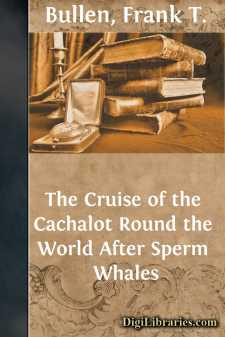Categories
- Antiques & Collectibles 13
- Architecture 36
- Art 48
- Bibles 22
- Biography & Autobiography 813
- Body, Mind & Spirit 142
- Business & Economics 28
- Children's Books 17
- Children's Fiction 14
- Computers 4
- Cooking 94
- Crafts & Hobbies 4
- Drama 346
- Education 46
- Family & Relationships 57
- Fiction 11829
- Games 19
- Gardening 17
- Health & Fitness 34
- History 1377
- House & Home 1
- Humor 147
- Juvenile Fiction 1873
- Juvenile Nonfiction 202
- Language Arts & Disciplines 88
- Law 16
- Literary Collections 686
- Literary Criticism 179
- Mathematics 13
- Medical 41
- Music 40
- Nature 179
- Non-Classifiable 1768
- Performing Arts 7
- Periodicals 1453
- Philosophy 64
- Photography 2
- Poetry 896
- Political Science 203
- Psychology 42
- Reference 154
- Religion 513
- Science 126
- Self-Help 84
- Social Science 81
- Sports & Recreation 34
- Study Aids 3
- Technology & Engineering 59
- Transportation 23
- Travel 463
- True Crime 29
The Cruise of the Cachalot Round the World After Sperm Whales
by: Frank T. Bullen
Categories:
Description:
Excerpt
INTRODUCTION
Without attempting the ambitious task of presenting a comprehensive sketch of the origin, rise, and fall of whale-fishing as a whole, it seems necessary to give a brief outline of that portion of the subject bearing upon the theme of the present book before plunging into the first chapter.
This preliminary is the more needed for the reason alluded to in the Preface—the want of knowledge of the subject that is apparent everywhere. The Greenland whale fishery has been so popularized that most people know something about it; the sperm whale fishery still awaits its Scoresby and a like train of imitators and borrowers.
Cachalots, or sperm whales, must have been captured on the coasts of Europe in a desultory way from a very early date, by the incidental allusions to the prime products spermaceti and ambergris which are found in so many ancient writers, Shakespeare's reference—"The sovereign'st thing on earth was parmaceti for an inward bruise"—will be familiar to most people, as well as Milton's mention of the delicacies at Satan's feast—"Grisamber steamed"—not to carry quotation any further.
But in the year 1690 the brave and hardy fishermen of the north-east coasts of North America established that systematic pursuit of the cachalot which has thriven so wonderfully ever since, although it must be confessed that the last few years have witnessed a serious decline in this great branch of trade.
For many years the American colonists completely engrossed this branch of the whale fishery, contentedly leaving to Great Britain and the continental nations the monopoly of the northern or Arctic fisheries, while they cruised the stormy, if milder, seas around their own shores.
For the resultant products, their best customer was the mother country, and a lucrative commerce steadily grew up between the two countries. But when the march of events brought the unfortunate and wholly unnecessary War of Independence, this flourishing trade was the first to suffer, and many of the daring fishermen became our fiercest foes on board their own men-of-war.
The total stoppage of the importation of sperm oil and spermaceti was naturally severely felt in England, for time had not permitted the invention of substitutes. In consequence of this, ten ships were equipped and sent out to the sperm whale fishery from England in 1776, most of them owned by one London firm, the Messrs. Enderby. The next year, in order to encourage the infant enterprise, a Government bounty, graduated from L500 to L1000 per ship, was granted. Under this fostering care the number of ships engaged in the sperm whale fishery progressively increased until 1791, when it attained its maximum.
This method of whaling being quite new to our whalemen, it was necessary, at great cost, to hire American officers and harpooners to instruct them in the ways of dealing with these highly active and dangerous cetacea. Naturally, it was by-and-by found possible to dispense with the services of these auxiliaries; but it must be confessed that the business never seems to have found such favour, or to have been prosecuted with such smartness, among our whalemen as it has by the Americans....


